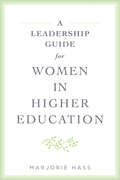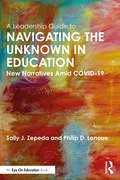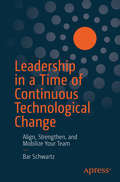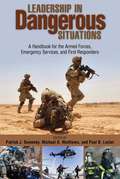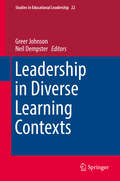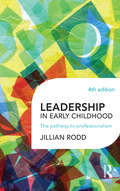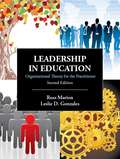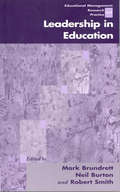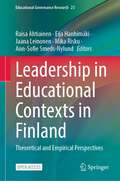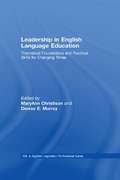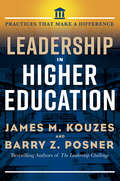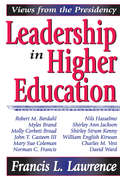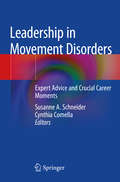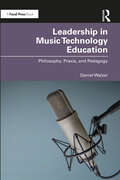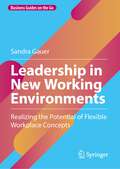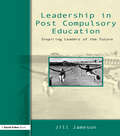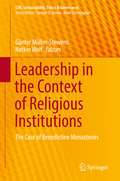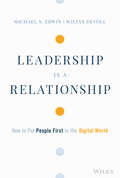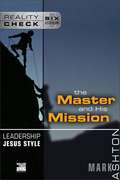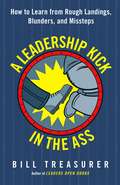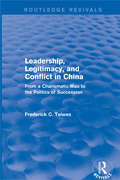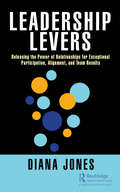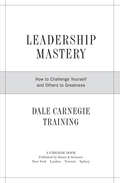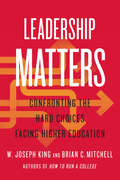- Table View
- List View
A Leadership Guide for Women in Higher Education
by Marjorie HassWomen face unique challenges as they move into senior leadership roles at colleges and universities. This guide provides them with the frank, supportive advice they need to advance their careers and lead with excellence.For years, Marjorie Hass, now the president of Rhodes College, was approached by women in higher education looking for advice and support as they took on leadership roles and navigated challenging career paths. Eventually, she began offering online seminars so she could meet in small groups to answer questions and encourage women to develop mutually supportive relationships. In A Leadership Guide for Women in Higher Education, Hass draws on her sixteen years of senior leadership experience, her work with national higher education organizations, and her mentorship work with dozens of women to address fundamental issues women face when they lead in higher education.Aiming to level the playing field by giving women the insightful, supportive advice they need to advance in their careers and to lead with excellence, Hass combines practical information with career coaching. In this frank guide to launching, building, and advancing your academic career, Hass addresses a wide range of topics, including• deciding whether academic leadership is for you• developing a personal leadership style• becoming comfortable with power, ambition, and personal voice• navigating patriarchal assumptions• finding joy in leadership work• gaining experience with budget management, revenue generation, personnel management, and fund-raising—no matter your current job title• effectively managing conflict• aligning personal and career values and goals• winning your next job• and much moreWomen at any stage of their academic leadership career will find this guide insightful, useful, and empowering, as will anyone interested in supporting women leaders and diversifying leadership in higher education.
A Leadership Guide to Navigating the Unknown in Education: New Narratives Amid COVID-19
by Sally J. Zepeda Philip D. LanoueRecognizing that education systems have been temporarily paralyzed in the past and likely will in the future—whether it’s because of a natural disaster or a pandemic—this important volume offers critical insights about how schools can effectively carry forward the mission of educating all children even in the face of system turbulence and disruption. Featuring Narratives from expert leaders in urban, rural, and suburban school systems, this book explores important questions about the "new normal" such as the ways in which students can and should learn, how educators can teach and lead effectively, and how schools can carry out important functions beyond their instructional mission. Chapters present inspiring stories of leaders and teachers who have rallied, rebuilt, and problem-solved in face of the pandemic and amid adversity, ultimately providing a roadmap for how it’s possible to rebuild and adjust while preserving the fundamental core of education. Full of takeaways and first-hand insights into how systems and their schools faced turbulence, disruption, and adaptation, this book is a must-read for today’s educators committed to making a positive impact on the students they have the duty to serve.
Leadership in a Time of Continuous Technological Change: Align, Strengthen, and Mobilize Your Team
by Bar SchwartzDigital technology is rapidly challenging the way we do business, interact with our communities, and learn about the world. Due to this, leading change in your digital organization now comes with unprecedented tools and platforms to make your teams the most effective they can be. Leadership in a Time of Continuous Technological Change has arrived at this pivotal moment and is your roadmap for this exciting, evolving journey. Author Bar Schwartz introduces a holistic framework for leaders to take the reins in the digital Wild West. Achieving your team’s goals in this new environment will require high creativity, an entrepreneurial mindset, and a diversity of perspectives to solve problems that have never before been tackled. Roles and responsibilities have morphed, and what made you successful in the past may no longer apply. Leadership in a Time of Continuous Technological Change is an unmatched resource fit for our new decade. Through analyzing detailed case studies, you will see how understanding your identity paves the way to achieving emancipation, capability, and autonomy. Ultimately, you will be empowered to lead with clarity. Your team has everything they need to excel. Discover how alignment and clarity can support you in launching your team to new heights.What You Will LearnExamine case studies of different situations that can arise within a team and go through lists of takeaway questions that leaders can start asking to gain quick winsAdopt an agile mindset while taking into consideration the existing culture in the organizationCommunicate and align on expectations and goals with your team in a time of organizational change Who This Book Is ForEmerging leaders who are dealing with change or leading change and seek to increase the level of alignment and clarity for their people and themselves
Leadership in America's Best Urban Schools
by Cynthia L. Uline Joseph F. Johnson, Jr. Lynne G. PerezLeadership in America’s Best Urban Schools describes and demystifies the qualities that successful leaders rely on to make a difference at all levels of urban school leadership. Grounded in research, this volume reveals the multiple challenges that real urban elementary, middle, and high schools face as well as the catalysts for improvement. This insightful resource explores the critical leadership characteristics found in high-performing urban schools and gives leaders the tools to move their schools to higher levels of achievement for all students—but especially for those who are low-income, English-language learners, and from various racial and ethnic backgrounds. In shining a light on the essential qualities for exceptional leadership at all levels of urban schools, this book is a valuable guide for all educators and administrators to nurture, influence, support, and sustain excellence and equity at their schools.
Leadership in Dangerous Situations
by Michael D. Matthews Patrick Sweeney Paul B. LesterLeadership in Dangerous Situations provides in-depth coverage of the key psychological, social and organization factors that impact individual and organizational effectiveness for First Responders in dangerous environments. Leading scholars discuss how current theories and empirical research provides guidelines to help solve the challenges leaders are likely to face in dangerous contexts. This book is directed to First Responders leaders from the Military, Law Enforcement, Fire, Emergency Services and Not-for profit agencies working in dangerous areas. The purpose of this book is to assist the First Responders who risk their lives to serve the public, to prepare for the unique challenges of leading and operating in dangerous situations. Dangerous situations are environments where group members must routinely engage in events that place their physical and psychological well-being at risk to accomplish the organization's objectives. International scholars and practitioners from the military, law enforcement, fire and rescue, teamed together to address the unique challenges facing dangerous context leaders. Each chapter integrates theory and research with practical experience to address the various challenges these leaders will face while operating in dangerous situations. The intent is to provide practitioners an easily understandable guide, backed by scholarly findings, to prepare themselves and their organizations for the unique psychological, social, and physical challenges of leading and operating in dangerous contexts. The blending of theory and empirical research with practical experience clearly illustrates the principles of effective leadership in dangerous contexts Whether one is a young leader preparing for war, a seasoned commander with multiple combat tours, a Special Weapons and Tactics (SWAT) team leader, Emergency Medical Technician (EMT) supervisor, first line supervisor of a law enforcement patrol unit, or a lieutenant responsible for a shift of firemen, the challenges of leading people in contexts where life and death decisions are common are very similar. The purpose here is to provide the leader with a better understanding of what is required to lead in dangerous contexts. The contributing authors delve into the psychological, social, and physical factors that can impact the ability to lead, the ability of personnel to perform, and the organization's ability to accomplish the mission. In the end, the leader will take away not only a understanding of how leading in dangerous contexts is different than leading in contexts where lives are not on the line, but also gain a deeper understanding of why it differs, where commonalities occur, and - perhaps more importantly - how to prepare leaders, whether military or civilian to guide their first responder organizations to perform successfully in dangerous situations.
Leadership in Diverse Learning Contexts
by Greer Johnson Neil DempsterThis book presents the outcomes of research and practical endeavour in some of the diverse contexts in which learning takes place: classrooms, schools, professional development settings, community projects and service sector agencies. It invites the reader to engage with two related questions of contemporary concern in the leadership field: "What can we learn about the important influence of different contexts on leadership practice and how are people brought together as collective human agents in different patterns of distributive leadership?" In doing so, this collection emphasises three of the critical concepts at play when leadership is viewed, not as position, but as activity. The three concepts are purpose, context and human agency. When this view of leadership is understood, it is always about achieving shared goals with people power, no matter the circumstances in which they are gathered together.
Leadership in Early Childhood: The pathway to professionalism
by Jillian Rodd'Essential reading and a powerful tool for emerging early childhood leaders.' - Catharine Hydon, Early Childhood ConsultantWith increasing community insistence for quality and accountability in early childhood education and care, there is a need for effective and professional leadership in these services. Leadership in Early Childhood is a practical resource for early childhood practitioners who want to understand how to create and sustain successful childcare and early education settings.Fully revised and updated, this fourth edition is divided into three sections: deconstructing leadership; leadership in practice; and special responsibilities of early childhood leaders. This edition also includes new case studies, an additional chapter summarising the key contributing factors to effective leadership and examples based on an extensive international study of early childhood leaders.Leadership in Early Childhood has been widely used in early childhood education programs and as a professional reference text and remains a valuable resource for both students and professionals.
Leadership In Education: Organizational Theory For The Practitioner
by Russ Marion Leslie D. GonzalesLeadership in Education: Organizational Theory for the Practitioner
Leadership in Education: From The Top Down And The Bottom Up (Centre for Educational Leadership and Management)
by Robert Smith Neil Burton Mark Brundrett`Leadership in education is receiving increasing attention, and this text contributes much to the debate. A useful text that will appeal to a wide audience of senior managers, teachers, programme designers and researchers' - Learning and Skills Research `If one were on a fact-finding mission to gain insight into leadership thought and practice in education, then this book is an excellent resource' - Education News `This book makes an excellent contribution to the current debate on Educational Leadership. It blends theory with practice and provides an important resource for many aspects of leadership development programmes at a variety of levels. The book will appeal to the academic reader, the postgraduate student and those involved in providing leadership courses at a professional level. There is an international perspective on the analysis of leadership theory and practice, integrating examples from a variety of cultural settings and exploring education at all phases from primary to higher' - Stephen Merrill, Edge Hill College of Higher Education, Journal of In-Service Education `Leadership in Education offers an excellent analysis of the current debate: well informed on research and practice, positive but critical. It is particularly strong on what it calls "the railway-bookstall offerings of context-independent leadership".... There is a great deal of practical wisdom within these very accessible pages' - Michael Duffy, Times Educational Supplement This book deals with leadership in all sectors, from primary to higher education. It presents an international perspective on the analysis of leadership theory and practice, with the integration of exemplars from different cultural settings. The authors provide a wide range of conceptual perspectives on leadership. Themes include: - the efficacy of centralized versus distributed concepts of leadership - the contrast between competency and academic models of leadership development - the contradistinction between functionalist and democratic models of leadership. These themes are developed in four sections: - Conceptualization - Leadership development - Teachers as leaders - Leadership in practice Contributors include: Clive Dimmock, Peter Gronn, Marianne Coleman, Peter Ribbins, Ray Bolam, Peter Newton, Kenneth Leithwood, Helen Gunter, Lynn Davis, Clive Harber and Graham Peeke This book is recommended to all involved in educational management, particularly to students, teachers, researchers, policy makers and educational administrators. The Centre for Educational Leadership and Management series, edited by Tony Bush, examines the impact of the many changes in the management of schools and colleges, drawing on empirical evidence. The approach if analytical rather than descriptive and generates conclusions about the most effective ways of managing schools on the basis of research evidence.
Leadership in Educational Contexts in Finland: Theoretical and Empirical Perspectives (Educational Governance Research #23)
by Raisa Ahtiainen Eija Hanhimäki Jaana Leinonen Mika Risku Ann-Sofie Smeds-NylundThis open access book provides a comprehensive overview and in-depth coverage of contemporary aspects of leadership in the field of education in Finland. It brings together Finnish scholars to critically explore and discuss leadership in education in the context of the Finnish education system and in relation to international discourses around the topic. It discusses the phenomenon of leadership in educational contexts through several novel empirical and theoretical research designs. It includes themes such as distributed leadership and collaborative governance, changing aspects in the leadership profession, and contradictions in everyday organizational practices and realities. The work also combines conceptual discussions in educational and pedagogical leadership to analyze and to clarify the theoretical and conceptual multidimensionality and ambiguities.
Leadership in English Language Education: Theoretical Foundations and Practical Skills for Changing Times (ESL & Applied Linguistics Professional Series)
by MaryAnn Christison Denise E. MurrayLeadership in English Language Education: Theoretical Foundations and Practical Skills for Changing Times presents both theoretical approaches to leadership and practical skills leaders in English language education need to be effective. Discussing practical skills in detail, and providing readers with the opportunity to acquire new skills and apply them in their own contexts, the text is organized around three themes: The roles and characteristics of leaders Skills for leading ELT leadership in practice Leadership theories and approaches from business and industry are applied to and conclusions are drawn for English language teaching in a variety of organizational contexts, including intensive English programs in English-speaking countries, TESOL departments in universities, ESL programs in community colleges, EFL departments in non-English speaking countries, adult education programs, and commercial ELT centers and schools around the world. This is an essential resource for all administrators, teachers, academics, and teacher candidates in English language education.
Leadership in Higher Education: Practices That Make A Difference
by Jim Kouzes Barry PosnerThe authors of the classic bestseller The Leadership Challenge bring their expertise to higher education, offering five practices that can make any college or university leader into an exemplary leader. Drawing on the same pioneering research that formed the foundation of their classic bestseller The Leadership Challenge (over 2.7 million copies sold), James Kouzes and Barry Posner offer a set of leadership skills and practices that will make a significant difference in every area of higher education—faculty, administration, library services, career counseling, auxiliary services, campus safety, and more. It's about the behaviors that leaders, regardless of their position, use to transform values into actions, visions into realities, obstacles into innovations, segments into solidarity, and risks into rewards. Kouzes and Posner tell the leadership story from the inside and move outward, describing it first as a personal journey and then as mobilizing others to want to do things they have never done before. The Five Practices of Exemplary Leadership is the operating system for this adventure. Leadership in Higher Education explains the fundamental principles that support these practices and provides case examples of people in higher education who demonstrate each one. A core theme that weaves its way through all the chapters is that, whether it's one to one or one to many, leadership is a relationship between those who aspire to lead and those who choose to follow. We need leaders who can unite us and ignite us. This book lights the way.
Leadership in Higher Education: Views from the Presidency
by Francis L. LawrenceIn this collection of interviews, presidents and chancellors of some of America's most respected universities candidly reflect on their experiences during the decade leading up to the twenty-first century and immediately following it. This was a time of change and uncertainty, when opportunities for achievement and potential for failure made their role uncommonly challenging, and success called for considerable determination, integrity, foresight, skill, and courage.The American higher education system, often characterized as the best in the world, is distinguished for its scholarship as well as its accessibility. Its indispensable role as an engine for individual and societal economic advancement has made universities the targets of media interest, critical examination, and political manipulation. Higher education has become the passport to the American dream, and the percentage of those going to college has increased, challenging individual institutions and systems to accommodate growing numbers of aspiring students while searching for solutions to problems of inadequate college preparation and inadequate financial assistance for low-income students. Despite their increasing importance to the nation, the region, and their communities, public and private universities have seen states reduce their support to their state systems of higher education, shifting the responsibility to individuals and institutions.Leadership in Higher Education traces the careers of thirteen women and men who have presided over a total of twenty universities or university systems and three national organizations of higher education: Robert Berdahl, Myles Brand, Molly Corbett Broad, John T. Casteen III, Mary Sue Coleman, Norman C. Francis, Nils Hasselmo, Shirley Ann Jackson, Shirley Strum Kenny, William English Kirwan, Francis L. Lawrence, Charles M. Vest, and David Ward.
Leadership in Movement Disorders: Expert Advice and Crucial Career Moments
by Susanne A. Schneider Cynthia ComellaThis book provides insights into the meaningful milestones of leaders and world experts in the field of movement disorders/neurology. Through the format of interview questions, it communicates the skills of key leaders in movement disorders. The interviewees are past and present leaders of the International Parkinson and Movement Disorders Society (IPMDS), which has grown from a young society into a strong successful organization. Their experiences reflect the nature of working in the global environment and diversity of this Society. The stories in this book have value that transcends a specific Society and will provide lessons in leadership that have application to many organizations around the world. This is a key resource for movement disorders experts, clinicians, scientists and young neurologists who are planning the next step in their career. It is also of interest to organizations who are facing the task of engaging and leading an international group of diverse participants.
Leadership in Music Technology Education: Philosophy, Praxis, and Pedagogy
by Daniel WalzerLeadership in Music Technology Education examines the pedagogical, sociocultural, and philosophical issues that affect curriculum, research, and decision-making in music technology in higher education. This book considers a range of cutting-edge topics, including the impact of the COVID-19 pandemic, professional development concepts, partnerships between higher education and the creative and cultural industries, and the effects technology has on sustainability. Drawing on Leadership theories, including Transformational, Situational, Servant, and Social Change Model Theory, the book puts forward a new model, Creative Industry Leadership, which considers the sociocultural aspects of Music Technology Education, and interrogates biased ideologies that limit opportunities for a broad range of learners and practitioners in education and beyond. Additionally, Leadership in Music Technology Education examines educators’ informal leadership capacities during the COVID-19 pandemic and how inclusive pedagogy expands the creative boundaries of teaching, learning, and music-making for all. Leadership in Music Technology Education is crucial reading for instructors teaching audio engineering and music technology, as well as researchers in education, music pedagogy and related fields. This is also a valuable read for anyone with an interest in music technology and its many potentialities.
Leadership in New Working Environments: Realizing the Potential of Flexible Workplace Concepts (Business Guides on the Go)
by Sandra GauerThis book discusses the challenges that modern and flexible workplace concepts pose for managers. In particular, it addresses the uncertainties and stress factors that employees face when working in multi-space environments and how they become attached to their workplace. Drawing on a hybrid methodological approach that combines a literature review with practical lessons learned as a workplace change consultant, it offers managers concrete advice on how to lead in multi-space environments. This book aims to reduce the uncertainties and stressors caused by new work environments, and ideally to transform them into growth opportunities for the entire company. Providing concrete solutions, it represents a valuable asset for managers, HR professionals, and workplace initiative leaders alike.
Leadership in Post-Compulsory Education: Inspiring Leaders of the Future
by Jill JamesonLeadership of different kinds exists at many levels in the post-compulsory sector-from principles to programme leaders, administrative staff and even caretakers. Based around case studies of current leaders in post-compulsory education, this unique book explores a number of leadership models and styles in order to provide inspiration and guidance for the next wave of potential leaders. * Captures authentic "voices of the leaders" * Includes examples of further, adult, community and prison education * Covers all type of leadership: charismatic leaders, academic leaders, spiritual leaders, women leaders, ethnic leaders, ethnic leaders, business leaders Presenting a wide and holistic view of leadership at different levels, this book is relevant for all potential and current leaders in post-compulsory education. By encouraging readers to review and reflect on the models described, the book will inspire leaders of the future to develop their own leadership styles and visions.
Leadership in the Context of Religious Institutions: The Case of Benedictine Monasteries (CSR, Sustainability, Ethics & Governance)
by Günter Müller-Stewens Notker WolfThis book explores opportunities and limitations with regard to transferring knowledge and tools from the corporate world to manage monasteries or other types of religious institutions. To do so, the contributing authors analyze both the ideological and practical implications of employing modern organizational theory in the context of religious institutions, and seek to strike a balance between preserving traditions and promoting modernization. In this regard, they draw on experience gained in the course of long-standing collaborations between religious institutions, such as monasteries, and business and management schools.
Leadership is a Relationship: How to Put People First in the Digital World
by Michael S. Erwin Willys DeVollDiscover how putting people first creates vibrant organizations and profound change In Leadership is a Relationship, accomplished founders and authors Michael S. Erwin and Willys DeVoll deliver an insightful collection of interviews with leaders who have succeeded by prioritizing the wellbeing of other people. Featuring fresh stories from leaders like Olympic legend Kerri Walsh Jennings, former Secretary of Veterans Affairs Bob McDonald, and visionary principal Dr. Virginia Hill, the book shows how you too can become a relationship-based leader and thrive in our chaotic, digital world. By highlighting role models from different careers, backgrounds, skill sets, and schools of thought, the authors offer readers an inspiring antidote to one of the most serious—and underreported—crises of our era: the damage that digital distractions have done to our personal relationships. The book offers: Concrete strategies for combating the depersonalization of the Information Age and strengthening our connections with other people Real stories of how people from Olympic champions to small-business owners have put people first Take-away tips for the busy reader who needs quick insight or hopes to use the book in a modular curriculum for their organization or class Perfect for anyone who wants lead both morally and effectively, Leadership is a Relationship provides a concise and convincing argument that leaders who put people first have the best chance of succeeding in the twenty-first century.
Leadership Jesus Style: The Master and His Mission
by Mark AshtonThe Reality Check series makes just one assumption: that you’re serious enough about your spiritual journey to investigate Christianity with an open mind. This isn’t about joining anyone’s religious club—it’s about being real with yourself and with the others in your group. Since no one has all the answers, there’s plenty of room for discussion. After all, if there is any truth to the Bible’s stories about Jesus, then one thing he’d welcome are questions and opinions that come from honest, earnest hearts. Whether you’re leading a corporation, a sports team, your family, or simply your own pursuits, issues such as mission, character, vision casting, and team building are critical to your success. Wouldn’t it be great to take lessons from a master leader? Here’s your opportunity. Nobody in history has surpassed Jesus of Nazareth in either methods or results. Find out his leadership secrets. They’re guaranteed to make you a better leader. Leadership Jesus Style includes these sessions: Upside-Down Leadership What’s Your Mission? Casting a Vision The Master Strategist Building a Team When Others Fail For the Group Leader Reality Check is for spiritual seekers of every persuasion. Uncompromisingly Christian in its perspective, it steers wide of pat answers and aims at honesty. This innovative and thought-provoking series will challenge you and those in your group to connect heart to heart as together you explore the interface between Jesus, the Bible, and the realities of this world in which we live.
A Leadership Kick in the Ass: How to Learn from Rough Landings, Blunders, and Missteps
by Bill Treasurer"This is one of the most unique and valuable books you will read all year, and I highly recommend it."--Jim Kouzes, coauthor of the bestselling and award-winning The Leadership Challenge and Dean's Executive Fellow of Leadership, Leavey School of Business, Santa Clara UniversityEven the best leaders--in fact, most of the best leaders--start out as decidedly bad ones. And sooner or later they reach a moment of reckoning that leadership expert Bill Treasurer calls the leadership kick in the ass. When it happens, it feels like it's all over. But Treasurer says that with the right attitude, that kick can be a new beginning. Based on his work with thousands of leaders, this book reveals how to turn those ego-bruising events into the kind of transformative experiences that mark the paths of great leaders. As Steve Jobs famously said, "Getting fired was the best thing that ever happened to me." This book is a survival guide, coach, and morale booster to help you use that kick to move forward instead of fall down. If you succeed, the next place you get kicked might be upstairs.
Leadership, Legitimacy, and Conflict in China: From a Charismatic Mao to the Politics of Succession (Routledge Revivals)
by Frederick C TeiwesThis title was first published in 1984: This text provides a source of citations to North American scholarships relating specifically to the area of Eastern Europe and the former Soviet Union. It indexes fields of scholarship such as the humanities, arts, technology and life sciences and all kinds of scholarship such as PhDs.
Leadership Levers: Releasing the Power of Relationships for Exceptional Participation, Alignment, and Team Results
by Diana JonesThere’s an epidemic of leadership failure—whether something as small as a meeting, or as large as implementing enterprise wide change. Leaders know that sinking feeling when a gap emerges between themselves and the groups they most need to engage with. Leaders and business schools are looking in the wrong places for the cause. What holds most leaders back, as if their foot is always on the brake, is their failure to engage, and gain alignment. This book shows the reasons why. Leaders rarely recognise that: Shaping group behavior is describable as a process, which they can learn. Instead, they unconsciously fall into relationship patterns influenced by early family experiences. Informal relationship patterns have a dramatic effect on results, which is why birds in flight manage to alter course without bumping into each other. Leadership and collaboration are primarily a matter of principles and process, and not personality and content alone. If leaders master the process, they achieve consistent results. This book reveals the leadership levers to release the power of relationships for exceptional participation, alignment and results in organizations. It enables leaders to mine the brilliance that often lies dormant and untapped within their organizations. Readers will have the principles and tools to go beyond the agenda, truly engage with those around them, and release untapped capacities within their organizations. These qualities and skills will inspire associates and employees.
Leadership Mastery
by Dale Carnegie TrainingIn a world becoming more and more virtual, human relations skills are being lost -- along with the skill of leadership. And yet never before have these abilities been more valuable or sought after. What's needed is a new type of leader -- one who can inspire and motivate others while adhering to timeless leadership principles such as flexibility, adaptability, trustworthiness, and distribution of power. With Leadership Mastery, you will identify your strengths and adopt effective strategies to: Gain the respect and admiration of others using little-known secrets of America's most successful leaders Get family, friends, and coworkers to do what you ask because they want to, not because they have to Respond effectively in a crisis Make powerful decisions and follow through on them using Carnegie's action formula Incorporating interviews with top leaders in business, entertainment, sports, and academia, Leadership Mastery stands next to the classic How to Win Friends and Influence People.
Leadership Matters: Confronting the Hard Choices Facing Higher Education
by W. Joseph King Brian C. MitchellLeadership matters more than ever in this turbulent moment in American higher education.During these unprecedented times, glaring internal inefficiencies, communication breakdowns, and an overriding sense of cultural inertia on many campuses are too often set against a backdrop of changing consumer preferences, high sticker prices, declining demand, massive tuition discounting, aging infrastructure, technological and pedagogical alternatives, and political pressure. Strategic leadership in such a complex environment needs to be exercised in nuanced ways that differ from those embraced by corporate cultures. In Leadership Matters, W. Joseph King and Brian C. Mitchell argue that the success of higher education institutions depends on strategic leaders who can utilize the strengths of their institutions and leaders to balance internal pressures, shifting demographics, global education needs, and workforce preparation demands beyond the college gates. Drawing on their extensive experience, the authors guide senior administration, trustees, and presidents on how to lead during immense financial, demographic, and social challenges. King and Mitchell believe that, to survive, colleges must be well run—flexible, effective, and forward thinking. The authors begin with a fundamental premise—that colleges and universities must evolve and adapt by modernizing their practices, monetizing their assets, focusing on core educational strategies, and linking explicitly to the modern world. Discussing a broad range of leadership positions, including presidents, provosts, and board chairs, Leadership Matters touches on strategic planning, management and operations, stakeholder relations, campus and community, accreditation and athletic conferences, and much more. The authors offer an optimistic assessment based upon frank and stark conclusions about what colleges must do—and must not do—to remain relevant in the coming decades.
